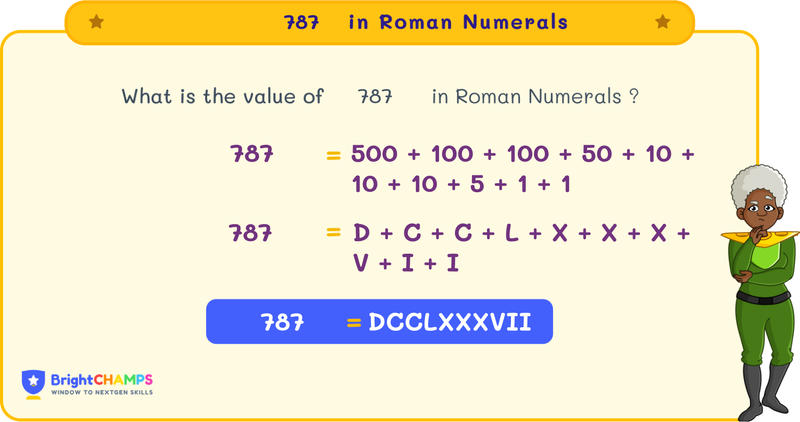
 162 Learners
162 LearnersLast updated on May 26th, 2025

787 in Roman Numerals

Roman numerals are a way of expressing numbers using symbols. The symbols I, V, X, L, C, D, and M are used in Roman Numerals. They appear in royal titles, book names, sequences, and more. Here we will discuss Roman Numerals, rules, and examples.
What is 787 in Roman Numerals?
You might have encountered Roman Numerals in various contexts like royal titles, such as Henry VIII or Elizabeth II. Roman Numerals were devised as a method of counting when life became more complex, and a standardized system was needed.
Ancient Romans used symbols like I (1), V (5), X (10), L (50), C (100), D (500), and M (1000).
In Roman Numerals, we use DCCLXXXVII to represent 787, where D is 500, C is 100, L is 50, X is 10, and VII is 7. Let’s learn more about Roman numerals and how to write them.

Struggling with Math?
Get 1:1 Coaching to Boost Grades Fast !

Basic Rules for 787 in Roman Numerals
There are certain basic rules for writing numbers in Roman Numerals. Let's discuss some essential rules to remember when writing numbers in Roman numerals.
Rule 1: Addition Method
The addition method is used when a smaller number follows a larger number. For example, in DCCLXXXVII, D (500) is followed by two C's (100 each), then L (50), three X's (10 each), and VII (7), which adds up to 787.
Rule 2: Repetition Method
Roman Numerals like I, X, C, and M can be repeated up to three times to represent numbers. For example, XXX = 30.
Rule 3: Subtraction Method
A smaller numeral before a larger numeral indicates subtraction. For example, IX = 10 - 1 = 9.
Rule 4: Limitation Rule
Symbols cannot be repeated more than three times, and certain symbols like V, L, and D cannot be repeated. For instance, we write VIII for 8, not IIIIIIII.
How to Write 787 in Roman Numerals
Let’s learn how to write 787 in Roman Numerals using different methods. By Expansion Method By Grouping Method
787 in Roman Numerals by Expansion Method
The expansion method involves breaking down the number based on place value. Let's see how 787 is written in Roman numerals using this method.
Step 1: Break down the number based on place value: 700 + 80 + 7.
Step 2: Convert each part into Roman Numerals:
- 700 in Roman Numerals — DCC (500 + 100 + 100)
- 80 in Roman Numerals — LXXX (50 + 10 + 10 + 10)
- 7 in Roman Numerals — VII
Step 3: Combine the Roman Numerals: Therefore, 787 in Roman Numerals is DCC + LXXX + VII = DCCLXXXVII
787 in Roman Numerals by Grouping Method
When writing a large number in Roman Numerals, we can group the number. To write 787, group it as 700 + 80 + 7.
- 700 in Roman Numerals - DCC
- 80 in Roman Numerals - LXXX
- 7 in Roman Numerals - VII
So, 787 is written as DCCLXXXVII in Roman Numerals.

Common Mistakes and How to Avoid Them in 787 Roman Numerals
Mistakes often occur when writing numbers in Roman Numerals. To master Roman Numerals, it's helpful to learn from common mistakes and how to avoid them.
Level Up with a Math Certification!
2X Faster Learning (Grades 1-12)


787 in Roman Numerals Examples

Problem 1
Calculate the sum of DCCLXXXVII and XIII using Roman numerals.

The sum of DCCLXXXVII and XIII is DCCC.
Explanation
In Roman numerals, DCCLXXXVII is 787 and XIII is 13.
The sum of 787 and 13 is 800.
800 in Roman numerals is DCCC.

Problem 2
A historian finds DCCLXXXVII ancient coins and wants to distribute them equally among CXXV chests. How many coins will each chest contain?

Each chest will contain VI coins.
Explanation
To find out how many coins each chest will contain, divide the total number of coins by the number of chests: DCCLXXXVII / CXXV.
DCCLXXXVII = 787
CXXV = 125
787 / 125 = 6 with a remainder 6 in Roman numerals is VI.

Problem 3
A collector has DCCLXXXVII stamps. After selling CCLXV stamps, how many stamps does the collector have left?

The collector has DXXII stamps left.
Explanation
The collector originally has DCCLXXXVII (787) stamps. After selling CCLXV (265) stamps, the remaining number of stamps is 787 - 265 = 522. 522 in Roman numerals is DXXII.

Problem 4
Convert the multiplication of LXXIX and X to Roman numerals.

The product of LXXIX and X is DCCXC.
Explanation
LXXIX is 79 and X is 10.
The product of 79 and 10 is 790.
790 in Roman numerals is DCCXC.

Problem 5
What is the Roman numeral representation of the average of DCCLXXXVII and DCXXXI?

The average of DCCLXXXVII and DCXXXI is DCCIX.
Explanation
First, find the sum of DCCLXXXVII (787) and DCXXXI (631), which equals 1418.
Divide by 2 to find the average:
1418 / 2 = 709.
709 in Roman numerals is DCCIX.

Turn your child into a math star!
#1 Math Hack Schools Won't Teach!


FAQs on 787 in Roman Numerals
1.What is 786 in Roman numerals?
2.How to write 787 in Roman numerals?
3.What is 790 in Roman Numerals?
4.Is DCCLXXXVII a prime number?
5.What are the multiples of 787?
6.How can children in Qatar use numbers in everyday life to understand 787 in Roman Numerals?
7.What are some fun ways kids in Qatar can practice 787 in Roman Numerals with numbers?
8.What role do numbers and 787 in Roman Numerals play in helping children in Qatar develop problem-solving skills?
9.How can families in Qatar create number-rich environments to improve 787 in Roman Numerals skills?
Struggling with Math?
Get 1:1 Coaching to Boost Grades Fast !

Important Glossaries for 787 in Roman Numerals
- Addition rule: Used when a larger numeral is followed by a smaller numeral; their values are added. For example, DCCLXXXVII = DCC + LXXX + VII = 787.
- Grouping method: Numbers are grouped based on place value and then converted into Roman numerals. For example, 787 = 700 + 80 + 7 = DCCLXXXVII.
- Repetition rule: Certain numerals (I, X, C, M) can be repeated up to three times. For example, XXX = 30.
- Subtraction rule: Applied when a smaller numeral precedes a larger one, indicating subtraction. For example, IV = 4 (5 - 1).
- Basic symbols: Key symbols in Roman Numerals include I (1), V (5), X (10), L (50), C (100), D (500), and M (1000).
Explore More numbers
![Important Math Links Icon]() Previous to 787 in Roman Numerals
Previous to 787 in Roman Numerals
About BrightChamps in Qatar


Hiralee Lalitkumar Makwana
About the Author
Hiralee Lalitkumar Makwana has almost two years of teaching experience. She is a number ninja as she loves numbers. Her interest in numbers can be seen in the way she cracks math puzzles and hidden patterns.
Fun Fact
: She loves to read number jokes and games.




